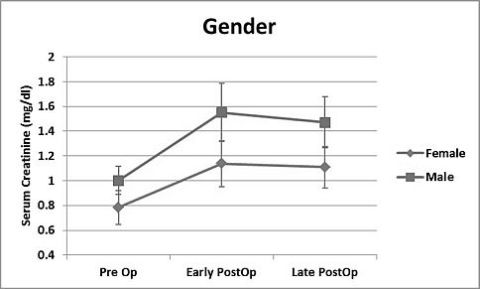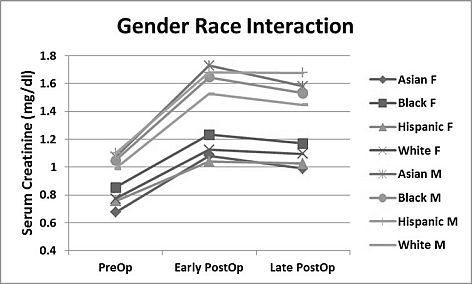Factors Influencing Creatinine Rise Following Donor Nephrectomy
Kidney and Pancreas Transplantation, Vanderbilt University, Nashville, TN
Meeting: 2013 American Transplant Congress
Abstract number: 197
Introduction: Identifying factors influencing the rise in creatinine following donor nephrectomy will permit appropriate candidate selection and help ensure the long term safety of live kidney donors.
Methods: The data source for this study is a donor registry that was developed to facilitate long term follow up and permit critical analysis of outcomes following live donor kidney donation. Descriptive statistics were generated and a repeated measures analysis of variance was conducted on serial creatinine values to quantitate the impact of factors on renal function post donation.
Results: A total of 737 live donor nephrectomies were performed between 2000 and 2012. Data from 562 patients was available for analysis. 365 donors were female, 197 were male. The mean (max,min) of age, BMI, preoperative serum creatinine, 24hr CrCl, and 24hr urine protein were 27 (42, 14), 0.86mg/dl (2.0, 0.5), 133ml/min (255,65) and 127mg (590,0) respectively. The mean increase (max,min) in serum creatinine observed during the first postoperative week was 49% (123, 0) over the preoperative baseline. This improved somewhat to 44% (112, 3.8) when measured after post-operative day 60. Male gender, black race and lower creatinine clearance were significantly associated with higher increases in serum creatinine by repeated measures analysis of variance. The effect of race is predominantly due to disproportionate increases in serum creatinine observed in black females.


Conclusion: Ensuring short and long term patient safety is the prominent concern in selecting and operating on live kidney donors. Males of all races, black females and individuals with relatively low creatinine clearance are at risk for having higher creatinines following donor nephrectomy. Longer term follow-up is necessary to determine the clinical relevance of our observations.
To cite this abstract in AMA style:
Hale D, Moore D, Wu X. Factors Influencing Creatinine Rise Following Donor Nephrectomy [abstract]. Am J Transplant. 2013; 13 (suppl 5). https://atcmeetingabstracts.com/abstract/factors-influencing-creatinine-rise-following-donor-nephrectomy/. Accessed February 16, 2026.« Back to 2013 American Transplant Congress
